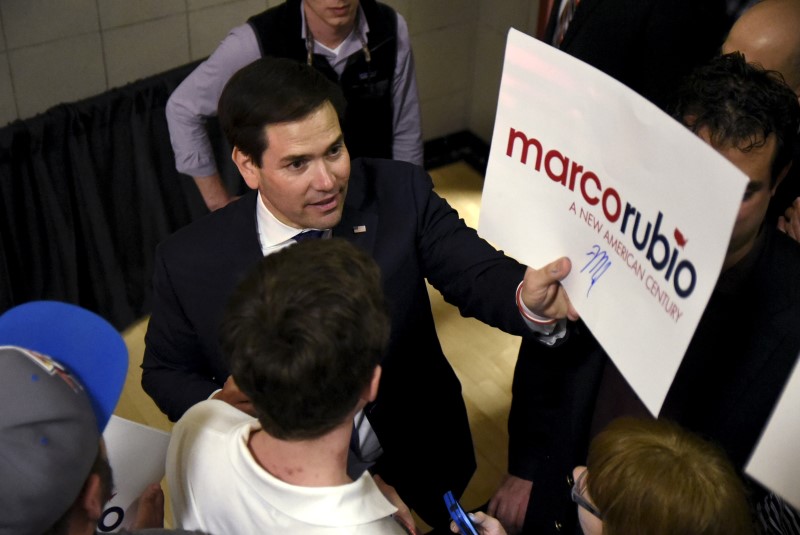By Ginger Gibson and Grant Smith
WASHINGTON/NEW YORK (Reuters) - Backers of Republican presidential hopeful Marco Rubio have spent nearly as much money in the weeks leading up to Super Tuesday's nominating contests as all of his rivals combined, including an outsized spend in Texas.
The Super PAC supporting the U.S. senator from Florida, Conservative Solutions, poured $4.2 million into 10 Super Tuesday states between Feb. 10 and Feb. 27, almost twice as much as groups backing rival Ted Cruz, according to a Reuters analysis of Federal Election Commission filings.
Super PACs supporting all candidates combined, including Rubio, spent $8.8 million in those states during that period.
The biggest chunk of money from Rubio's allied Super PAC was $1.5 million targeting U.S. Senator Cruz's home state of Texas, the biggest prize among the Super Tuesday states in terms of the number of delegates up for grabs. (Click here for a graphic: http://tmsnrt.rs/1Lr2J0c )
Cruz is poised to defeat Republican front-runner Donald Trump in Texas by a double-digit margin, with Rubio running a distant third in opinion polls.
Efforts to reach an official at Conservative Solutions were unsuccessful, but experts said the spending could be an effort to prevent Cruz from reaching a threshold of victory that would allow him to sweep the state's 155 delegates.
"Given the delegate allocation, if Rubio can keep Trump or Cruz under 50 percent in some districts, he stops them from getting all the delegates in that district," said University of Houston political science professor Brandon Rottinghaus. In the Texas Republican primary, delegates are allocated proportionally by congressional district.
Texas-based Republican strategist Joe Brettell said a strong showing by Rubio in the state could also help the 44-year-old senator justify another run for the presidency in 2020 if he should fail to win the nomination this time.
Rubio has emerged as the Republican establishment's favored candidate to take on Trump for the presidential nomination, drawing a flood of endorsements and donor cash since former Florida Governor Jeb Bush dropped out on Feb. 20.
But the senator has struggled to distinguish himself from Cruz in both the polls and recent nominating contests.
Cruz's allied Super PAC spent $738,000 in his home state during the period. Trump's campaign is largely self-funded and he does not have an allied Super PAC.
The review of Super PAC spending does not include money spent by campaigns, which are set to disclose their February spending on March 20. Super PACs supporting the candidates, as well as other outside groups trying to influence voters, are required to notify the Federal Election Commission shortly after purchasing ads.
Super PACs, which were created after the U.S. Supreme Court's Citizens United decision in 2010, can raise and spend unlimited amounts of money but are barred from coordinating with the campaigns.
This year is shaping up to be one of the most expensive elections in American history. And a lot of the money lately has been spent targeting Trump.
Between the Super PACs supporting Rubio and Cruz as well as other groups that are working to bring down Trump, $7.2 million has been spent in Super Tuesday states and in national ad buys attacking the New York real estate billionaire, according to the Reuters review.

One of the ads the Conservative Solutions PAC is running in Texas takes aim at Trump University, a for-profit program he launched that is now the subject of lawsuits from unhappy attendees. Trump called for the ad to be taken down, saying it was inaccurate.